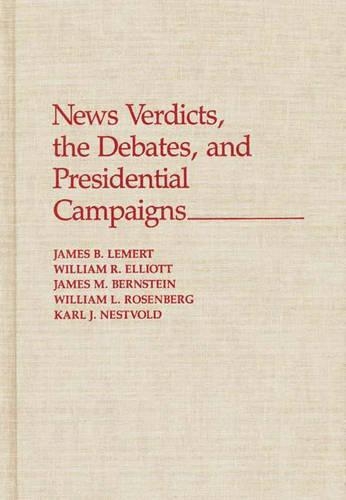
News Verdicts, the Debates, and Presidential Campaigns
(Hardback)
Publishing Details
News Verdicts, the Debates, and Presidential Campaigns
By (Author) James Bernstein
By (author) William Elliott
By (author) James Lemert
By (author) Karl Nestvold
By (author) William Rosenberg
Bloomsbury Publishing PLC
Praeger Publishers Inc
30th October 1991
United States
Classifications
Tertiary Education
Non Fiction
News media and journalism
Communication studies
324.50973
Physical Properties
Hardback
312
Description
A study of verdict effects, this book gives new evidence that media assessments of presidential debates sways voters. The authors conducted 2500 surveys and analyses of news reports to scrutinize the post-debate news of 1988. They also examined the effects of the "attack ads" used by Bush and Dukakis. They found that news media consistently downplay debate content and instead emphasize their own views on candidate performance; media verdicts influence voters as much as the debates themselves. This work should be of interest to journalists, researchers and civic groups concerned with elections, government, campaign reform and communications.
Reviews
No one ever lost money underestimating the American voter! False, says this major study of presidential debates, whose dominant message is more issues and less hoopla. Is that just a predictable normative response And do the media best understand the public's real appetite This study says "no" to these interesting and difficult questions. Time-series methodology, even if "existing analytical techniques somewhat restrict interpretation," do "locate important changes in the ways our respondents rated the candidates as debaters, judged their images, shifted their voting intentions, and determined the importance of issues." The post-debate verdict effect, they conclude, actually occurs, at least until overtaken by another day, or by deeper pre-existing attitudes. A strategy for future research is offered, including embedding some of the variables of media coverage and commentary and analysis of the role of TV producers, reporters, and other gatekeepers. This work serves best as a model of the use of a battery of surveys to attack a problem. It will not allay our sense of unease with some of the common hypotheses. Upper-division undergraduates and graduate students.-Choice
"No one ever lost money underestimating the American voter! False, says this major study of presidential debates, whose dominant message is more issues and less hoopla. Is that just a predictable normative response And do the media best understand the public's real appetite This study says "no" to these interesting and difficult questions. Time-series methodology, even if "existing analytical techniques somewhat restrict interpretation," do "locate important changes in the ways our respondents rated the candidates as debaters, judged their images, shifted their voting intentions, and determined the importance of issues." The post-debate verdict effect, they conclude, actually occurs, at least until overtaken by another day, or by deeper pre-existing attitudes. A strategy for future research is offered, including embedding some of the variables of media coverage and commentary and analysis of the role of TV producers, reporters, and other gatekeepers. This work serves best as a model of the use of a battery of surveys to attack a problem. It will not allay our sense of unease with some of the common hypotheses. Upper-division undergraduates and graduate students."-Choice
Author Bio
JAMES B. LEMERT is Profesor and Journalism Graduate Studies Director at the University of Oregon. He is the author of two previous books, Does Mass Communication Change Public Opinion After All (1981) and Criticizing the Media: Empirical Approaches (1989), and dozens of research articles. Dr. Lemert teaches courses in public opinion, journalists' craft attitudes, and mass communication theory. WILLIAM R. ELLIOTT is Associate Professor and Head of Graduate Studies in Journalism at Southern Illinois University at Carbondale. He is the author of numerous journal articles and papers on media influences on the political process. Dr. Elliott teaches courses in mass communications theory, research methods, and theory construction. JAMES M. BERNSTEIN is Assistant Professor of Journalism at Indiana University. He currently teaches courses in broadcast journalism, public opinion, and the media as social institutions. Dr. Bernstein's research interests include public opinion, political communication, and television and politics. WILLIAM L. ROSENBERG is Associate Professor and Director of the Drexel University Survey Research Center. He has presented many papers and has authored numerous articles on politics and communication. In addition to serving as a media analyst during election campaigns, as well as a research consultant for local, state and national agencies, Dr. Rosenberg teaches courses in political communication, public opinion and propaganda, and research methods. KARL J. NESTVOLD, Professor and Associate Dean, is Head of the Broadcast News Sequence, School of Journalism, University of Oregon. Dr. Nestvold's research interests include the FCC theory of diversity, television news and public affairs, broadcasting in Great Britain, and the Soviet Union's external information programs.
